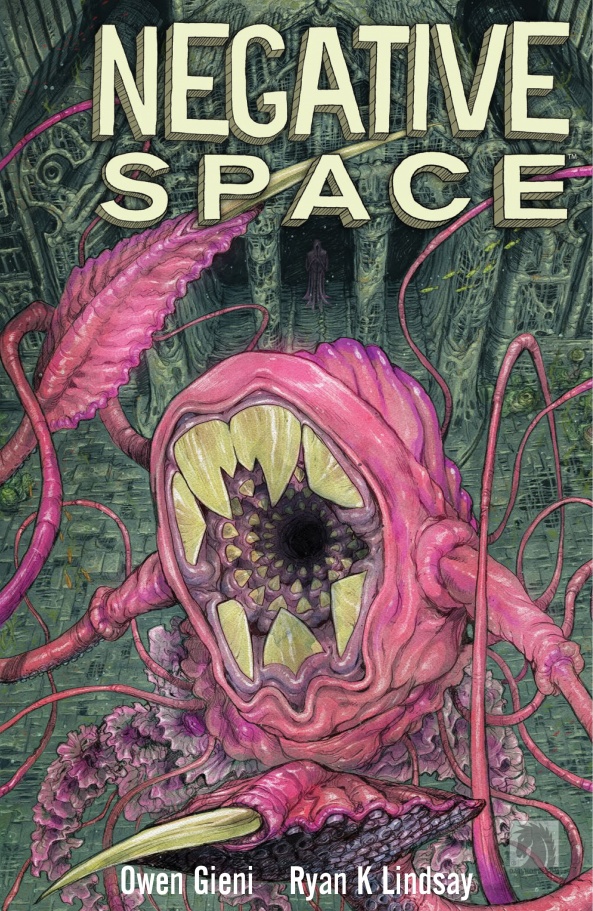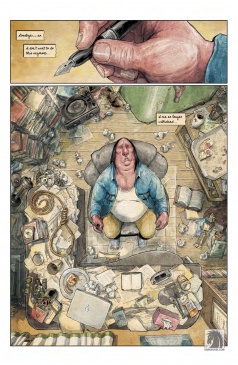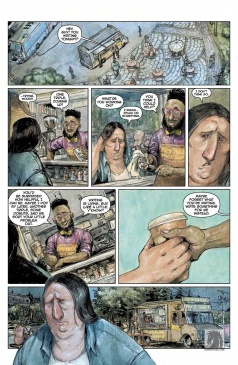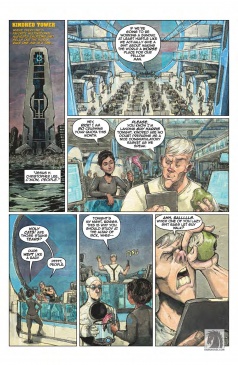
Depressed. Ready to end it all. But you’re hit with writer’s block while crafting your suicide note. You can’t even get that right. This is the place that Guy Harris finds himself in the opening of “Negative Space”, the upcoming Dark Horse book from Ryan K. Lindsay and Owen Gieni. After Guy goes for a walk to clear his head, the soulless corporation that’s trying to sell his despair tries to make his life a whole lot harder. And then things get even weirder.
Depression is something that doesn’t seem to be handled well in comics that often, but Lindsay and Gieni seem to do it justice in the first issue of “Negative Space”, all while giving it a crazy, sci-fi send up. It’s a touchy subject for many, but it’s something that Lindsay seems to be very mindful of, if you read on.
Read on as we chat with Ryan K. Lindsay about depression, corporations buying and selling our emotions, monsters at the bottom of the ocean, and a whole lot more. “Negative Space” #1 is still available for pre-order until 6/15 with the code MAY150012
“Negative Space” is coming from you and artist/co-creator Owen Gieni. For those who haven’t looked too much into it yet, what’s the story all about?
Ryan K. Lindsay: “Negative Space” is a four issue miniseries from Dark Horse I’m creating with artist Owen Gieni, with Ryan Ferrier letters. It’s about Guy Harris, a depressed writer, who sits down to pen his suicide note and gets writer’s block. He goes for a walk to clear his head and from there we throw him under the bus as a mega-corp seems to be hunting him for his emotions and making his night hell so he’ll finally locate the inspiration to get the words down and then off himself. All this occurs before we introduce the emotion eating monsters that just won’t stop.
When I first read about “Negative Space” and the idea of corporations harvesting emotions, it immediately made me think about that Facebook experiment where they only showed positive or negative posts in someone’s feed and thus influenced the statuses of users. It seems like something that could only happen in fiction, but we’re actually not too far from it. What caused you to hit upon that idea?
RKL: The book initially came about from what is the very first page, Guy sitting at his desk, frustrated, unable to write his final words. From there, I started to spiral out and work out how I could make this suicidal guy’s night actually become worse. I don’t remember consciously thinking about the Facebook experiment as I broke this story but it’s clearly an influence, and purely because it’s so insanely perverse and scary. We carry the internet around in our pockets, and dive our noses into it constantly, and it’s just this lethal pill we never know if we are avoiding, saving, swallowing, or grinding between our molars.
There’s a reason cyberbullying kills, and social media is addictive [like, a drug level addiction] and it’s because it’s insidious. So once we know our world is like that we then think about the fact we’ve handed over our souls, our sanity, and our safety to these mega-corps like Mac, Google, and Facebook. And they can and will toy with us however they like. We live a Philip K Dick dystopia where you wonder if there are layers we might come out of but instead we only ever seem to dig deeper.

We periodically freak out about our information being sold to third parties but imagine if they were selling our depression, our worst moments and thoughts. Imagine it now because I feel certain with our gaming consoles and televisions watching us and openly admitting they could be feeding information back, and our phones tracking our moves through GPS even when we aren’t trying to find our way to the nearest bakery using Maps, and with Fitbits on all wrists keeping info on our heartbeats and our sleep, with all this triangulated info, there’s no way we could stop a Bond villain level asshole making our lives a level of Dante’s Inferno.
Continued belowI think for something that affects so many people directly or indirectly, depression doesn’t feel adequately and genuinely represented in comics very often. I know I deal with it personally, and I know you’ve had experience with it. What are you hoping to do with how you portray depression and Guy’s character in “Negative Space”?
RKL: I’m hoping to portray his depression seriously and within the whole story. That crutch of showing your character as angsty, as contemplating suicide, but then they just go on working the narrative really irritates me because it’s lazy. It’s a shorthand for a character type, not a real character. I want Guy to oscillate, to go up and down, to wear his feelings on his sleeve. But throughout the story, first page to inky black last, I want Guy to carry this problem and have it affect his choices and his progress.
So with that extended choice of representation in place, then I want it to shine a small spotlight on male depression. It’s the unspeakable evil between most guys, and certainly a majority of the blokes I know. I can state without a doubt that most dudes I know would rather talk about a prostate exam, where another man they barely truly know had his finger up their butthole, more than they’d want to talk about their feelings. That seems insane to me. But guys put up the gruff exterior, they get down to chest puffing, and then they kill themselves because that’s easier than just admitting you aren’t the King Kong alpha you want to be, or worse, believe others expect you to be. Hopefully, through inception, little conversations get started and this book makes a difference. I know I’ve already had a tonne of people reach out to me to say how happy they are this book features depression, but is also about something else. It’s not a textbook, it’s an insane gonzo sci fi noir, but the same way Jaws makes me think about fatherhood, and The Abyss was also about responsibility in marriage, then I’m hoping we bring some noise for this global problem that’s too often off the radar.
I think most people will likely be most familiar with Owen Gieni as the colorist on titles like “Manifest Destiny” or “Shutter”, though he has multiple webcomics to his name. How did the two of you hook up on this book?

RKL: We’ve been talking for years now. I think maybe we got started by both knowing the Canadian God of Grilled Cheese and Tears, Kurtis Wiebe. But that could be apocryphal. For too long we’ve been hoping to line something up and just waiting for that perfect lightning strike. As this story was coming into the field with Dark Horse I started chatting artists with Daniel Chabon [our editor supreme] and when I brought Owen’s name and work into the conversation that pretty well settled it straight away. Owen’s work is just so damn intricate, and heartfelt, and amazing that I couldn’t imagine the emotion hitting the page in this world in any other way. Owen’s going to make serious waves with the science he drops on the pages of this story.
After Guy hits writer’s block while crafting his suicide note, the people at Kindred set out to make his life increasingly difficult and push him over that edge. What makes Guy and his pain so special? Why him?
RKL: This is something we hint at in the first issue, and it’s not something Guy himself is aware of. He’s a writer, a guy in touch with his own emotions, and someone in love. He’s full of emotion and the way Guy oozes and processes emotions is special. He’s an empath of sorts, a special case where his feelings are stronger than your Regular Joe, which is why his suicide note is huge fodder for Kindred. It is going to be supercharged with the finest depression they can harvest from their special case they’ve been setting up for a long time. From there, we take things further, but you’ll need to read more of the story to see how/when.
Now we know a little about Guy, our depressed protagonist. What about our antagonists who are harvesting his emotions? And how do the aforementioned monsters come into play?
Continued belowRKL: We personify our antagonistic corporation through two of their top agents, Rick and Briggs. Rick is the hot shot agent who is wheezing his own juice pretty hardcore. Which means he’s a blast to write. And Owen has designed him so he’s this big bruiser of a guy but he’s not buff and defined, he’s just this thick slab of dude. It’s pretty ace, plus he wears a t-shirt and suspenders. I use Rick to represent this arrogant side of the corporation that operates in a way where it knows best, and it does what it wants, and it shouldn’t be accountable for the horrors it inflicts. That idea that a villain doesn’t think they’re villainous is fun, but I twist that a little here where they know what they are doing wrong but they kinda justify it anyway. Rick is just the asshole for the job.
Whereas, Briggs is a different kettle of fish entirely. She hates Rick, so that’s gotta earn her some cred on the street, right? And she’s relatively reserved and seems a little more human…but then she’s still a Kindred agent so there’s that. I wanted to play with the idea that the villain can absolutely be human sometimes and maybe we don’t know everything straight up. Briggs is a tricky one to write because I need to get her just perfect, but luckily Owen’s design for her is so insanely good. She’s got this fantastic figure where she’s not skinny or used as some bombshell femme fatale for the bad guys. She’s curvy and makes the Kindred suits look fantastic. She is a very human character on the page in the way she expresses herself and reacts and that’ll be fun for her arc across our whole story.

As for the monsters, the Evorah, they get references in the first issue a fair bit, they are this ominous boogeyman fuelling the Kindred fires, but we spend the issue building up our characters and stoking the flames of the horror of the Evorah so we can dive in for issue #2 [which we definitely do]. But put short, they are a horrific species of creatures from very deep in the ocean and they have spent centuries feeding off human suffering and depression because it is delicious and they are incredibly nasty. As you would imagine, Owen has gone above and beyond in his designs for these monstrosities.
One thing I noticed, and liked, while reading the first issue is that while Guy is depressed, that doesn’t really stop him from still being heroic in a way. He has a big heart and cares about others. Beyond just moving the story along, why was it important to have Guy move forward with other things rather than just become mired in his misery?
RKL: This was a huge element I spent ages with Daniel working on because he’s suicidally depressed but he’s still functioning through human moments and motions. If we made him frozen with depression then he’d never do anything, and we didn’t want him moping through every scene because that could be hard to propel the narrative forward as well as hold reader engagement.
As such, I thought about Guy like this for a lot of things. His suicidal depression manifests as such: he hates himself and thinks the world would be better without him. He doesn’t hate the world, he just doesn’t feel a part of it. He doesn’t hate others, he wishes he could connect to them, but he doesn’t feel he can, or should, or ever will. So if he sees a chance to do something good though he assumes he’ll fail he won’t stand idly by. It means our lead can be active as well as still depressed. He doesn’t want to see harm come to others or the world, he wants the world to be a better place, it’s just heartbreaking he thinks the best way to do that is remove himself from the world. But while stuck on the final words, he gets caught up in this insane whirlwind of action and reaction and sometimes human’s just react.
But don’t worry, his depression is black tar, and stronger than a wooly mammoth, so he won’t shake anything off too easily.
Continued below
To end the interview, I know you’ve been compiling a list on your site of resources for those who may need help with depression. To me, this takes “Negative Space” from just a comic to something a little more. What made you feel the need for this?
RKL: I realise with the high concept and from the very first page, we are dealing with sensitive subject matter. And I am not taking this lightly. As I foresaw me spending the rest of the year making tweets about suicide, discussing the currency of depression, I felt like maybe I’d need a tattooed trigger warning across my forehead. So I figured I could be proactive about this.
I understand suicide/depression. My father took his own life when I was very young. I lived in the aftermath of that event. I studied it, and how it could have happened without us seeing it coming. I know that to cope with it, I resort to humour. I know others who don’t know me, or have their own connection to that subject matter, have previously found me offensive in the moments I make light of it. Then they realise where I am coming from and they understand and it’s fistbumps for everyone.
I also know there are many people who have tried to take their own lives. People who contemplate it daily. It’s such an insidious killer in our society and one that I don’t feel isn’t raised anywhere near enough. So, finally, I knew that making this book would put suicide into some kind of spotlight and I could either ignore the gravity of it, or I could shy from it, or I could try to use it for some small good [and aren’t we all just trying to carve a series of miniscule moments of small good out of this spacebound rock we’re on?].
I came up with the idea of always running a link to my post [LINK] where I’ve curated a little blurb and then a list of resources for people depressed or contemplating suicide. I ran this idea past my wife who is a practising mental health nurse [who works for one of the linked programs] and she thought it was a good idea so that was my stamp of approval.
I would hate to think “Negative Space” reminded someone of the black pit their brain was in and made them feel stuck in it [and it’s not like I’m known for writing the upbeat feels] but the thought that someone, just one, would pick up the book, make their way to the link, and maybe check something out. Man, to do that, it’d be worth more than any sales or reviews could ever offer. Beyond stories, money, all we have is love and life and to get to prolong either is a truly beautiful thing and I can only ever hope things I do manage this once in a while.



